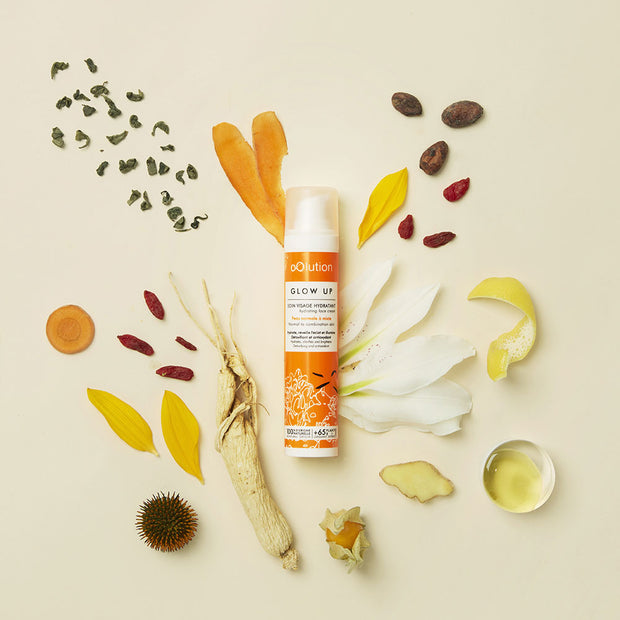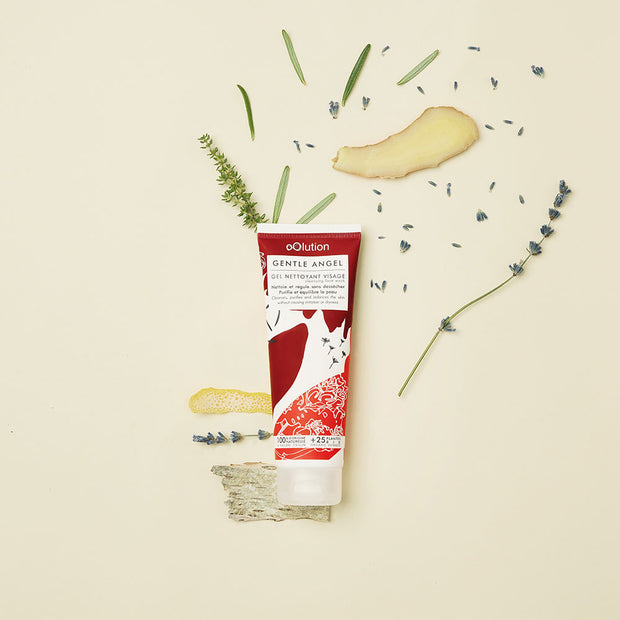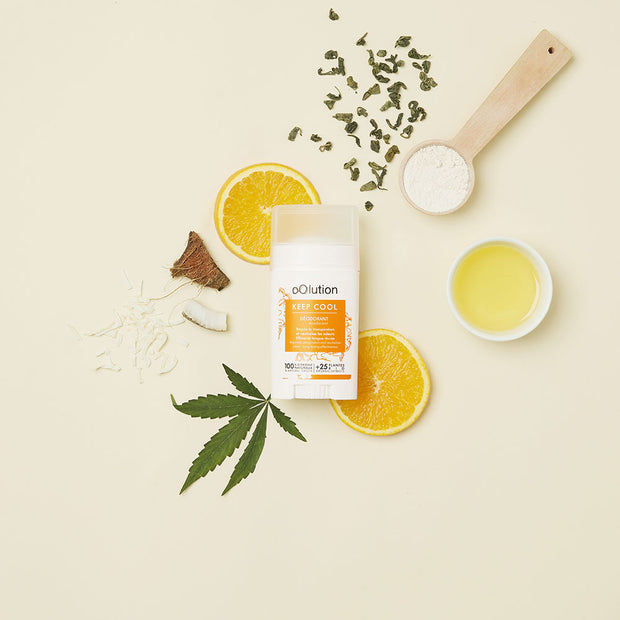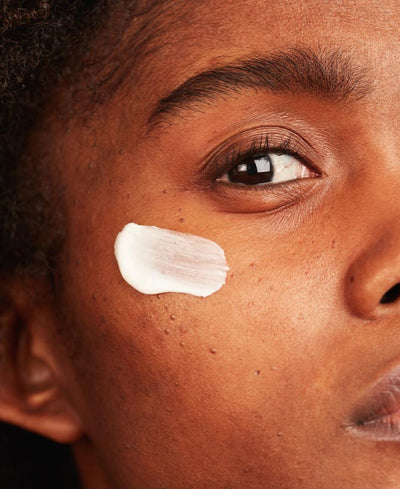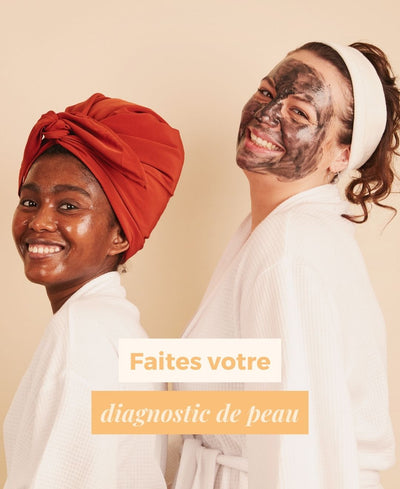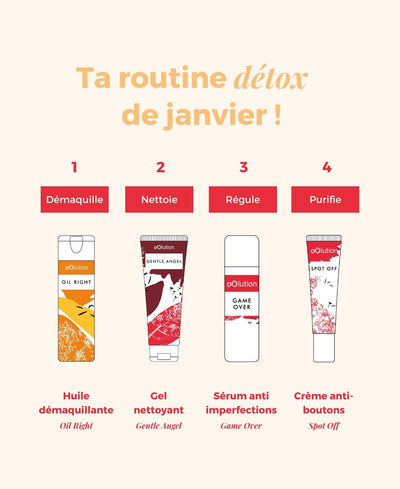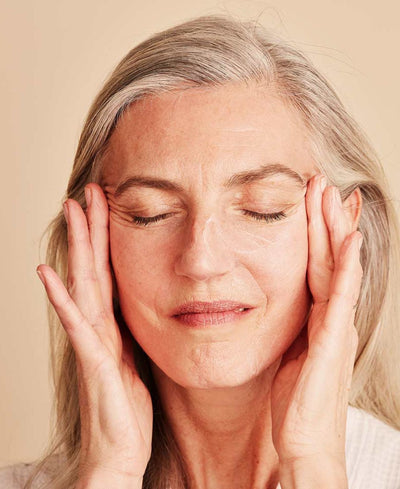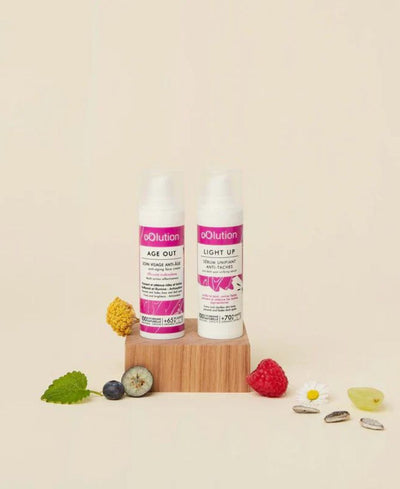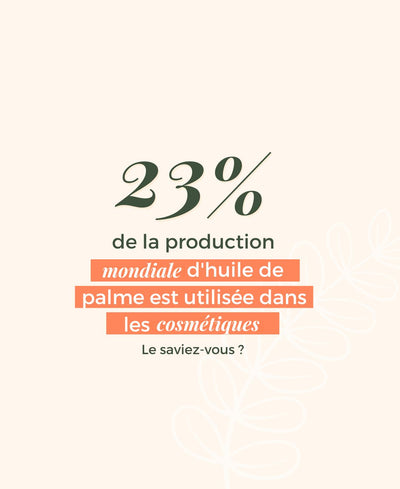
Deodorant with natural, effective and safe ingredients: how to avoid aluminium salts?
Written on 28.Oct.19 by Anne-Marie - Updated on 30.Sep.21
It's all set. Aluminum salts no longer have a place on your armpits: for your deodorant, you can now rely solely on natural ingredients. That's great! But it's not that simple... To combat the inconvenience of perspiration naturally AND effectively, while respecting your health and the environment, follow the guide!
Aluminum salts: what's the problem?
We've been talking about it for a few years now, but do you have a clear idea about aluminum salts? Aluminium chlorohydratealuminum zirconium pentachlorohydrate... are common in deodorants. What's in it for them? Astringent and able to capture water, they absorb perspiration and reduce sweating with unequalled effectiveness.
But not without damage... Small enough to penetrate all our tissues, they accumulate in our bodies, which are unable to get rid of them. They have been implicated in the development of neurodegenerative diseases such as Alzheimer's and Parkinson's, bone damage, anemia... 80% of breast cancers occur in the armpit. The very spot where deodorant is applied. Coincidence? Hm.
The doses of aluminum absorbed via our deodorants are minimal. True, but daily. And on particularly fine skin, often weakened by shaving and therefore hyper-permeable. And they're not the only ones: additives, food containers, other cosmetics and water are also sources of aluminum. In the end, a little + a little + a little is a lot! And while there's no consensus on the toxicity threshold for aluminum today, we do know one thing for sure: it's being lowered all the time... How much lower?
In short, the precautionary principle: no aluminum salts on your armpits! Extra caution when pregnant Aluminium salts are believed to cross the placental barrier...
How to avoid them?
There are actually two types of products on the market: simple deodorants and antiperspirants. thati reduce or even block perspiration. In fact, they prevent our bodies from eliminating toxins and regulating their temperature! And to thwart this vital natural process, guess which active ingredients they rely on? Bingo, aluminum salts: they contain up to 25%! So, first criterion: no antiperspirants.
What's more, eradicating every drop of sweat is perfectly pointless, as well as being dangerous to your health: our perspiration doesn't smell bad. It's the bacteria on our skin that feast on the proteins in our sweat, digesting them to produce (bad) smells. We can therefore act on two fronts: by masking odors and/or combating the proliferation of these bacteria, while letting the body perspire. This is what deodorants do.
But beware, a "deodorant" label is not a sufficient guarantee. Are you promised x hours of dryness? Your deodorant certainly contains aluminum salts... or other problematic ingredients such as synthetic synthetic fragrances, used to mask odors. Irritating, allergenic (skin rashes, breathing difficulties...), they often contain phthalates or synthetic musk, which are endocrine disruptors. Add a few classic classic in conventional cosmetics: preservatives, parabens, silicones... Want to know more? : Why go natural with deodorants?
A natural deodorant, yes, but not just any deodorant
Your deodorant is natural, free of synthetic ingredients, and even labeled organic: you're finally at peace. But not everything natural is recommended... So, which active ingredients should you choose?
Triethyl citrate: effective, but at a price!
Deodorants with "0% aluminum salts", especially organic ones, often replace them with triethyl citrate. It's anti-bacterial, inhibits the decomposition of sweat by bacteria without blocking perspiration, has a neutral odor and is very well tolerated by the skin. A dream for underarms!
Alas, it has a huge flaw: it's one of the many pseudonyms for palm oilIt's one of the many pseudonyms for palm oil, an environmental and social disaster that often goes undetected. No thanks: we'd rather deal with our own smells than be complicit in the disappearance of orangutans.
Alum stone: the false friend
Alum stone has long been THE natural, healthy solution to perspiration. Practical, antibacterial and slightly astringent, it regulates perspiration without blocking it, and lasts for years. Top of the range! Yes, but no. Because Alum stone is (notably) composed of aluminum salts. It is considered safer when natural (Potassium Alum) than totally synthetic (Ammonium Alum), but manufacturers themselves advise against using it after shaving, on the precautionary precautionary principle... Well, let's take it one step further: on its own or as an ingredient, avoid Alum stone.
Alcohol: short-lived well-being
Alcohol denat. on a cosmetics label? Flee: it's alcohol denatured by agents that are generally polluting, allergenic and sometimes toxic. But a natural natural and organic deodorant may well contain ethyl alcohol (alcohol ) derived from plant fermentation (as with wine). Antiseptic and antibacterial, it dries quickly and gives a pleasant sensation of freshness. Slightly astringent, it's also an excellent carrier for the odorant molecules responsible for masking unpleasant odors. Not bad!
The problem is its degreasing action... which attacks the lipids of the cutaneous barrier. The result: dry, irritated skin. Particularly to be avoided by sensitive skin and after shaving (the burning sensation will remind you...). Finally, beware of its photosensitizing action.
Baking soda: in moderation
Economical, biodegradable and highly effective Baking soda is a serious contender. A small pinch under each armpit is all it takes to absorb moisture and, above all, neutralize the acidity of sweat, which is conducive to bacterial growth. The result: no more unpleasant odours. Super-strong, it can even eliminate odours from your sports equipment, that's for sure! A magic powder? With one drawback: it can be irritating.. Choose a very fine powder, apply very small quantities without rubbing, remove any excess and avoid applying after shaving. You can also use a large make-up brush or mix it with coconut oil. But despite these precautions, sensitive skin may not appreciate it and sometimes, after weeks of carefree use, your skin says stop. At the slightest irritation, leave your armpits alone, without shaving or deodorant. Once things have settled down, opt for a bicarbonate-free deodorant.
Magnesium hydroxide: effective but expensive
The effectiveness of bicarbonate without the irritation ? It's real! Odorless, magnesium hydroxide lets the body perspire naturally, neutralizing acidity and thus bacterial growth. Its liquid form, milk of magnesia, is extremely practical (one drop under the armpits and you're ready to go).
The problem? If it's common in the USA, in France it's mainly found as a component of medicines (laxatives and digestive painkillers) or in powder form to prevent clammy hands when climbing. But don't run to the sports store: in this too-fine form, it exposes you to fine particles and is dangerous for the respiratory tract. That leavesimport via the Internet... as long as you pay the right price and are sure of the product's origin and composition.. And hello carbon footprint! However, more and more natural deodorants are including it in their compositions. Stay tuned!
Clays, powders and vegetable oils: for light perspiration
Don't perspire much? Skin- and planet-friendly clays, powders and vegetable oils can do the trick.
Clay (especially white clay), bamboo powder, arrowroot, cornstarch or tapioca flour absorb perspiration for an anti-moisture effect and reduce odors. Apply to dry skin to avoid clumping. And forget talc: although a member of the clay family, it may contain asbestos fibers and be carcinogenic.
The mild, non-greasy vegetable oils antiseptic and antifungal are also interesting: coconut oilCoconut oil is practical because it is solid at room temperature, sweet almond oilif you're not allergic to nuts. With the added benefit of being good for your skin!
One drawback: these active ingredients show their limits in cases of stress, heavy exertion or extreme heat. But when combined with essential oils and/or bicarbonate, they reinforce them while attenuating their undesirable effects. Good allies.
Essential oils: with care
Finally, some essential oils have a card to play: essential oil of Palmarosathe best-known, but also Geranium, Hamamelis, Lavender, Tea Tree oils... Able to inhibit bacterial development and regulate perspiration through their astringent action, they are highly effective, they are highly effective. Of course, if you can stand their sometimes heady fragrances.
Above all, respect these 2 principles:
- never use pure essential oil under your armpits to avoid burns! Mix them with a few drops of vegetable oil and keep a light hand;
- never use essential oils without sound information and/or professional advice. Particularly during pregnancy or breastfeeding. Some have an undesirable hormonal action, while others are downright abortifacient! Palmarosa, certain lavenders and mints, sage and geranium are totally prohibited. And if in doubt, follow the precautionary principle.
It's perfectly legitimate to find a solution to living well with perspiration: large halos and the associated odors from 9am onwards on public transport - there's no better way to start the day. But not at any price! Test these active ingredients, on their own or DIY, and look for them in 100% natural deodorants (ideally solid and zero waste). Above all, (re)learn to live with your perspiration: it's necessary for your body. In any case, no natural solution that respects your health can get rid of it ;)
Recommended products
